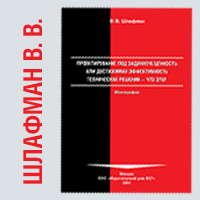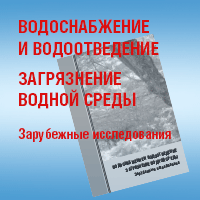№02|2015
WASTEWATER TREATMENT
bbk 000000
UDC 628.315.1
Ethanol distillery effluent treatment
Summary
The aspects of specific industrial effluents treatment of ethanol distilleries are considered. The industrial effluents are characterized by high organic concentrations, changing active reaction (pH) during the day and high temperature. The basic parameters of industrial effluents are presented (BODultimate, suspended solids, nitrogen, phosphates and sulfates), that are taken into consideration in the process of designing treatment facilities. Possible options of the process flow scheme that provide for separate and combined treatment of high- and low-concentrated waste effluents are given. The operation principles of two process flow schemes that include two-stage biological treatment (anaerobic and aerobic) and physical and chemical treatment that also has two-stages (removal of phosphates and sulfates) is described. The results of experimental studies carried out with the purpose of choosing the method of physical and chemical treatment of industrial effluents are presented. The studies were carried out both in laboratory and production environment with the use of lime and aluminium oxychloride activated with phosphorus acid. The method of sulfate fixation with barium chloride (BaCl2) in combination with ferrous and aluminium salts was studied. The laboratory studies were carried out with natural and artificially obtained wastewater with 200–300 mg/l sulfate and 30–50 mg/l phosphate concentrations; in both cases pH was equal to 4. It was stated that the use of aluminium oxychloride activated with phosphorous acid provided for the required level of phosphate and sulfate removal.
However, this method cannot be classified as economically feasible because of the large amount of generated chemical sludge that will be too expensive to remove to hazardous waste landfill. The use of barium chloride in combination with ferrous and aluminium salts provides for the required level of sulfate and phosphate removal; with that the amount of chemical sludge decreases 40-fold.
Key words
industrial wastewater , local sewerage treatment facilities , ethanol , phosphate and sulfate removal , organic and chemical sludge
The further text is accessible on a paid subscription.
For authorisation enter the login/password.
Or subscribe
REFERENCES
- Ambrosova G. T., Funk A. A., Ksenofontova O. V. [Profitable and economically sound farm]. Izvestiia Vuzov, Building Series, 2013, no. 10, pp. 65–70. (In Russian).
- Ambrosova G. T., Merkel’ O. M., Boiko T. A., Kochetkova O. V., Khvostova E. V., Chernykh M. M., Borozenets V. V., Perminov A. A., Maksurov M. Iu. [Pat. 2230041, RF. IPC С 02 F. Method of phosphorus removal from wastewater]. Izobreteniia. Poleznye Modeli, 2004, no. 16. (In Russian).
- Ambrosova G. T., Ksenofontova O. V., Kupnitskaia T. A. [Prognostication of the intensity of crystallization processes in pig farm wastewater drainage systems]. Izvestiia Vuzov, Building Series, 2003, no. 10, pp. 78–82. (In Russian).
- Ambrosova G. T., Merkel’ O. M., Boiko T. A., Maksurov M. Iu., Il’enia M. V., Bazhenova M. N., Tsittser E. V. [Pat. 2276108, RF. IPC С 02 F 3/30. Method of phosphorus removal from wastewater]. Izobreteniia. Poleznye Modeli, 2006, no. 13. (In Russian).
- Ambrosova G. T., Boiko T. A., Ksenofontova O. V., Funk A. A. [Studying the method of phosphorus removal from wastewater]. Stroiprofil’, 2006, no. 8, pp. 24–31. (In Russian).
- Surova L. M., Sidel’nikova S. Iu., Sal’nikova O. E., Pinigin V. K., Turanina E. N., Statkevich L. D. [Pat. 2071451, RF. IPC C 02 F 1/58. Method of sulfate ions removal from acid wastewater]. Izobreteniia. Poleznye Modeli, 1997. (In Russian).







